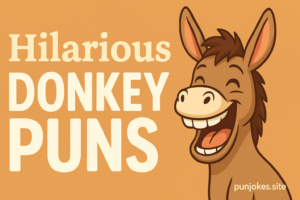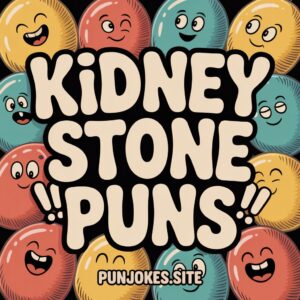Hilarious Orphan One-Liners That Stand Alone
The Best Orphan Puns and Jokes come as sharp one-liners. They hit fast with no long setup. Here are top examples:
- “What’s an orphan’s favorite movie? Home Alone.”
- “Orphans are terrible at playing catch—they don’t know where their family is.”
- “Why are orphans bad at baseball? They never know where home is.”
- “Knock knock.” “Who’s there?” “Not your parents.”
- “Why can’t orphans play baseball? They don’t know what home is.”
- “How do orphans go shopping? They just walk out with whatever they want—who’s going to tell their parents?”
- “What’s the difference between Batman and a regular orphan? About $1 billion.”
- “What do you call an orphan who becomes a famous musician? A self-made artist.”
- “Why do orphans like listening to rap music? Because they appreciate self-made artists.”
- “What’s an orphan’s least favorite day? Parent-teacher conferences.”
- “Why don’t orphans play hide and seek? Who would look for them?”
- “How many orphans does it take to change a lightbulb? None, they’re used to living in darkness.”
- “What’s an orphan’s favorite game? Family Feud—they’re hoping to find relatives.”
- “What’s the best thing about being an orphan? You never have to worry about disappointing your parents.”
- “An orphan’s family tree is just a stump.”
These jokes work by creating surprise turns. They start with normal situations like baseball or movies. Then they twist to something unexpected.
Parentless Punchlines: Savage Best Orphan Puns and Jokes Humor
Short-form jokes add small stories while staying quick. They use wordplay and double meanings:
- “An orphan walked into a family restaurant. The host asked, ‘Table for how many?’ The orphan replied, ‘Just one… as always.'”
- “Did you hear about the orphan who became a successful author? Critics say their characters lack development, but their protagonists are always remarkably independent.”
- “The orphanage talent show was a disaster. Nobody had any parent-approved acts.”
- “What do you call an orphan with a photographic memory? Parenthetically gifted.”
- “The hardest part about being an orphan is realizing you’re the main character in your own origin story.”
- “Orphans are the ultimate entrepreneurs—they’re self-made from the beginning.”
- “The orphanage basketball team doesn’t have fans, just foster supporters.”
- “An orphan applied for a family discount. The cashier said, ‘Where’s your family?’ The orphan said, ‘Exactly.'”
- “Why are orphans so good at telling scary stories? Because they know no one is coming to check under the bed.”
- “An orphan’s favorite day is Bring Your Child to Work Day. They can go anywhere.”
- “How does an orphan celebrate Christmas? Just like everyone else, but with fewer presents.”
- “The orphan’s career counselor suggested ‘self-made millionaire’ as a natural fit.”
- “The orphanage yearbook had no ‘Most Likely to Take After Their Parents’ category.”
- “Orphans make the best spies. They already know how to keep secrets from their family.”
- “What’s an orphan’s favorite movie genre? Origin stories.”
Best Orphan Puns and Joke That Push Boundaries
Some jokes push further into dark territory. These represent the edgier side of orphan humor:
- “Orphans are like free-range children—no one keeps track of where they go.”
- “Orphans make great secret-keepers. Who are they going to tell?”
- “What’s an orphan’s favorite game? Family Feud—they’re just hoping to find relatives.”
- “Orphans excel at hide and seek. No one’s looking for them anyway.”
- “Why don’t orphans play hide and seek? Because no one looks for them.”
- “Why don’t orphans celebrate Christmas? Because they have no-el.”
- “How many orphans does it take to change a lightbulb? None, they’re used to living in darkness.”
- “What’s an orphan’s favorite book? ‘A Series of Unfortunate Events’—they call it an autobiography.”
- “What’s the upside of being an orphan? You never have to worry about disappointing your parents.”
- “I asked an orphan what they got for Christmas. They said, ‘Nothing, just like every year.'”
- “Orphans don’t need Find My Friends app. Nobody’s looking for them.”
- “What’s an orphan’s least favorite nursery rhyme? ‘Daddy’s Gone A-Hunting.'”
- “Orphans never get hand-me-downs. They get stranger-donations.”
- “An orphan’s favorite holiday is Independence Day. They’ve been celebrating it their whole life.”
- “What do you call an orphan in a cemetery? Just visiting family.”
Self-Made Humor: Funny orphan jokes That Raised Themselves
Wordplay creates many great Orphan Puns and Jokes. These puns play with double meanings:
- “Orphans must be terrible at playing hide and seek—no one is looking for them.”
- “Why do orphans excel at self-help books? They’ve been raising themselves from the beginning.”
- “What’s an orphan’s least favorite musical? Annie-thing with happy endings.”
- “Orphans make great detectives. They’re used to looking for missing persons.”
- “What’s an orphan’s favorite mathematical principle? Finding the unknown relative.”
- “Orphans are naturally minimalist. They don’t keep family photos.”
- “What’s an orphan’s favorite TV show? ‘Who’s Your Daddy?'”
- “Orphans are naturally good at start-ups. They’ve been bootstrapping since birth.”
- “What’s an orphan’s favorite game? The Sims—finally, a family they can control.”
- “Why do orphans make great poets? They’re familiar with abandonment issues.”
- “Orphans are great at social distancing. They’ve been practicing their whole lives.”
- “What’s an orphan’s favorite browser? Chrome Incognito—no family history.”
- “Why do orphans make great astronomers? They’re always looking for their stars.”
- “What’s an orphan’s least favorite board game? Sorry! — No parents to blame.”
- “Orphans make natural entrepreneurs. They’ve been independent contractors since birth.”
- “What do you call an orphan who becomes famous? A self-made celebrity.”
- “Why are orphans good at gardening? They know what it’s like to be transplanted.”
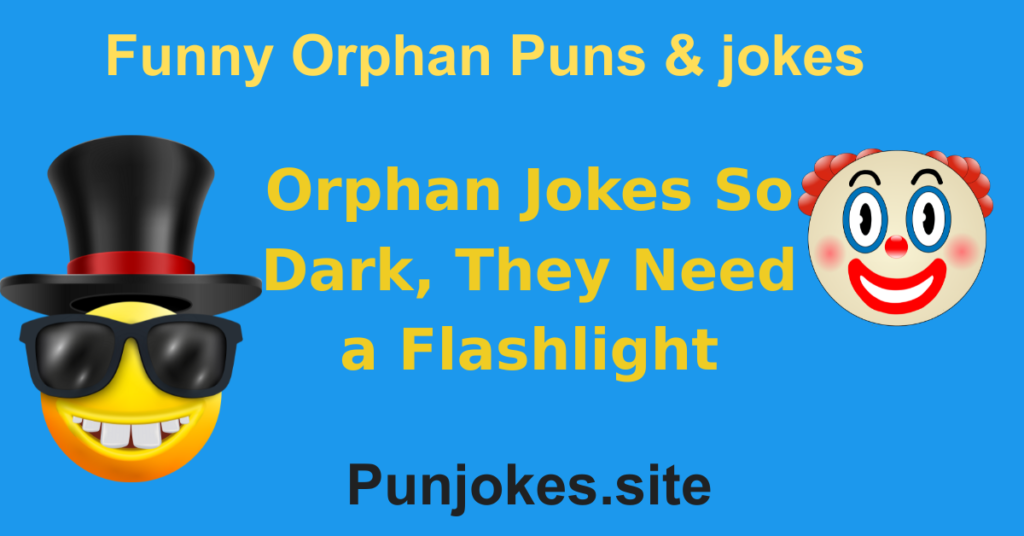
Batman & Beyond: Famous Orphans In Pop Culture
Entertainment loves orphan characters. From Harry Potter to Batman to Annie, they’re everywhere. This creates great joke material:
Superhero dark humor jokes
Most superheroes lost their parents. Batman, Superman, and Spider-Man all have orphan origin stories:
- “Batman’s parents aren’t dead, they just couldn’t handle his all-black fashion phase.”
- “Superman lost his parents AND his planet but still landed a journalism job. Talk about overcoming obstacles.”
- “The difference between a regular orphan and Batman? About 10 billion dollars.”
- “Spider-Man’s parents died so Marvel could avoid awkward dinner scenes.”
- “Iron Man and Batman prove the best superpower is being a rich orphan.”
- “Superheroes are just orphans with good insurance policies.”
Book Orphans
Literature loves orphan main characters:
- “Dickens wrote so many orphans because kids without parents make better stories. No adults solving their problems.”
- “Harry Potter: the boy who lived… with relatives because his parents didn’t.”
- “Jane Eyre proved Victorian orphans had better job options than today’s college graduates.”
- “Oliver Twist: the original ‘please sir, I want some parents.'”
Modern Media Orphans
Today’s shows and movies continue using orphans:
- “Game of Thrones should be called ‘Orphans Fighting Over Real Estate.'”
- “Rey from Star Wars was so desperate for parents she joined the Skywalker family.”
- “Stranger Things shows that being an orphan gives you powers, not trauma.”
- “The Fast and Furious franchise: where everyone eventually joins Vin Diesel’s orphan family.”
Media expert Jordan Lee says, “Stories love orphans because they have complete freedom. Without parents, characters must find their own way. This makes perfect stories about self-discovery.”
This explains why orphan jokes work so well. They use character types we all recognize from our favorite stories.
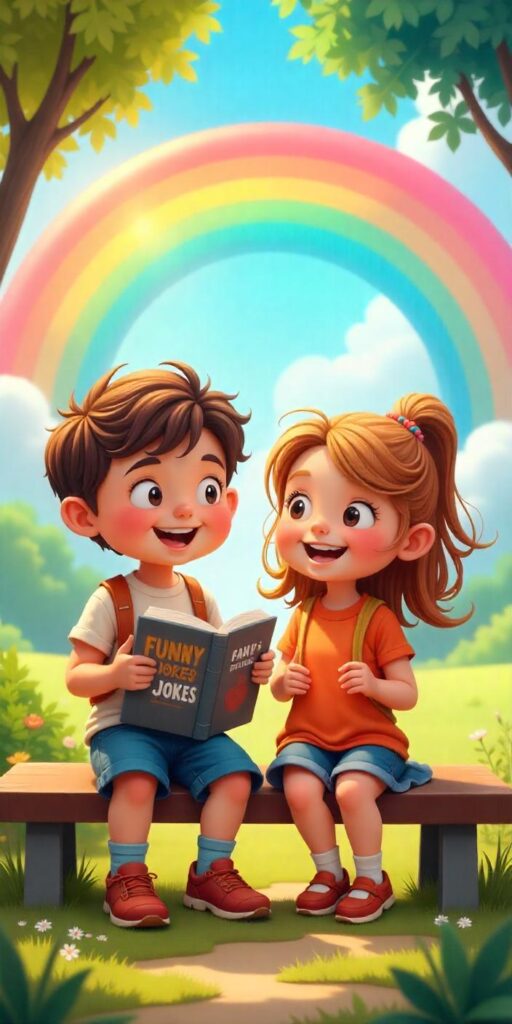
Best Orphan Puns That Will Make You Laugh Despite Everything
- I asked an orphan for their family tree. They handed me a blank sheet.
- Orphans are great at hide-and-seek. No one’s ever found their parents.
- I wanted to adopt an orphan, but they said, “I’m already used to being disappointed.”
- Orphans don’t get grounded… because no one cares where they are.
- Why did the orphan get into stand-up? No one was ever there to talk them out of it.
- Orphans make great mystery writers. They start every story with, “It was a dark and parentless night.”
- The only thing an orphan can inherit is emotional damage.
2. Top Dark Orphan Jokes & Puns That Push The Boundaries
- Orphans never get “Wait until your father gets home” threats. Perks?
- I asked an orphan what they got for Christmas. They said, “Loneliness. It’s a tradition.”
- Orphan dating profiles be like: “Looking for someone who won’t leave… because everyone already has.”
- What’s an orphan’s least favorite board game? Guess Who.
- Family dinner? What’s that, a fantasy RPG?
3. Short Orphan Puns: Quick Laughs With A Dark Twist
- What do you call an orphan with a GPS? Lost with extra steps.
- Orphan’s bedtime story: Just silence.
- They told me to act like I was raised right… so I left.
- Orphan’s favorite band? Imagine Parents.
- I asked an orphan where they were from. They said, “Trauma, mostly.”
- What’s an orphan’s dream job? Family counselor – for the irony.
- Orphan’s version of “Bring Your Parents to School Day” is just… awkward.
- My orphan friend said, “I grew up fast.” I said, “With no parents? You kinda had to.”
4. Funniest Orphan Puns & One-Liners For Dark Humor Lovers [2025]
- Orphans don’t cry at Disney movies – they’re just accurate.
- I asked if the orphan needed a ride. They said, “Nah, I’ve walked alone my whole life.”
- What’s an orphan’s least favorite memory? Family photos.
- Orphans don’t get curfews – they get forgotten.
- I told my orphan friend a dad joke… and we both cried.
- How do orphans stay strong? They lift themselves up – there’s no one else around.
(5. Parentless Punchlines: Orphan Puns That Found Their Way To Funny
- My orphan friend said, “I’m self-made.” I said, “No one’s arguing.”
- Orphans make the best magicians – they’ve been disappearing acts since day one.
- Orphan karaoke night? Just echoes.
- If orphans had a crest, it would be a shrug emoji.
- “Take me to your leader.” – Every orphan, subconsciously.
- I asked an Orphan Puns and Jokes who they look up to. They said, “Anyone who stayed.”
6. Hilariously Dark: Orphan Puns & Jokes That Stand On Their Own
- Why did the orphan start a podcast? So someone would finally listen.
- Orphans and smartphones – both suffer from low parental guidance.
- What’s an orphan’s favorite game? Solo player mode.
- Why don’t orphans make bad decisions? They had no one to disappoint.
- Orphan bar mitzvah? One-man show.
- When life gives you lemons, orphans just… make trauma cocktails.
7. Orphan Jokes 2025: Fresh Dark Humor That Needs No Guardian
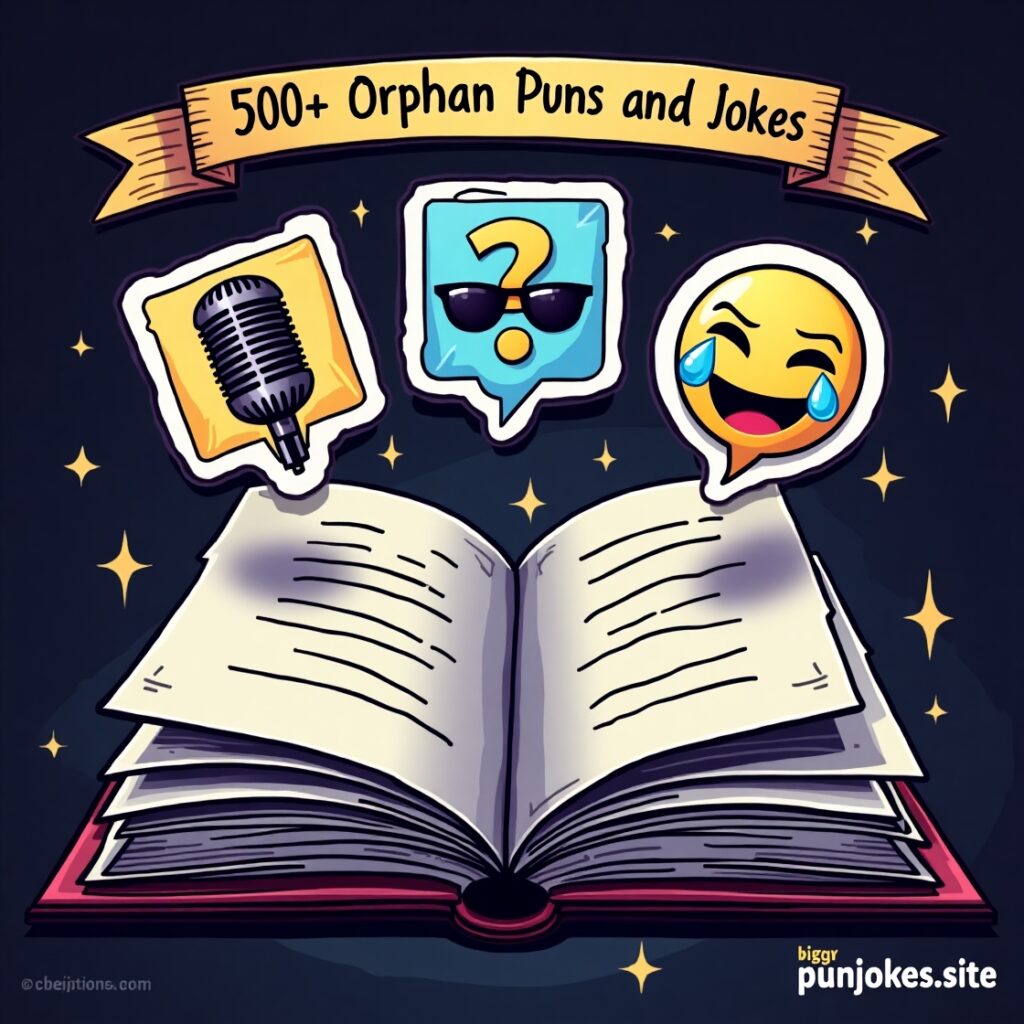
- “Home Alone” is just a documentary for orphans.
- Orphans play The Sims just to feel parental structure.
- What’s trending for orphans in 2025? A VR family.
- Orphans and AI have a lot in common – both are trained but never hugged.
- I asked a Gen Z orphan what hope looked like. They said, “A power outage on Mother’s Day.”
- Even ChatGPT said, “I can’t be your parent.” Ouch.
8. Laugh Without Parents: Orphan Puns That Raised Themselves
- “It takes a village” – unless you’re an orphan. Then it takes Wi-Fi.
- Why do orphans never get lost? They’re used to having no direction.
- Raised by wolves? Lucky. At least wolves stick around.
- What’s an orphan’s love language? Not abandonment.
- Independence? More like lifelong necessity.
- Orphans age in dog years – no support system speeds up the process.
9. Dark Comedy Gold: Orphan Puns & Jokes For The Twisted Mind
- What’s darker than an orphan joke? Their birthday parties.
- How do orphans stay positive? Gallows humor and memes.
- Every time an orphan blows out candles, a therapist gets a new patient.
- Orphan comedy clubs don’t have a family section.
- Orphans don’t run away – they just continue the legacy.
When Jokes Go Too Far: Finding The Line
Dark humor serves important purposes, but limits exist. Know these boundaries to enjoy dark jokes responsibly:
Where You Tell Matters
A joke that works with close friends might bomb in public settings. Dr. Aisha Williams explains, “Context shapes meaning. The same joke can build bonds or cause harm depending on who tells it, who hears it, and their relationship.”
Punch Up, Not Down
Good dark humor targets power structures, not vulnerable groups. Orphan jokes might seem to target vulnerable people. But the best ones actually highlight social systems or uncomfortable truths instead.
Your Intent Counts
Why you share a joke matters. Using dark humor to process difficult feelings differs from trying to hurt others or spread negative ideas.
Know Your Audience
Different groups have different humor limits. What works in a comedy club might fail on social media. Know who’s listening before you speak.
Comedy teacher Marcus Johnson advises, “Before telling a dark joke, ask yourself: Will this start a thoughtful conversation? Or am I just trying to shock people? Good dark humor does more than provoke—it reveals truth.”
Using orphan jokes responsibly requires thinking about these ethics. With care, dark humor can entertain and make people think without causing harm.
Comedy As Therapy: Laughing At Difficult Topics
Psychology research shows dark humor has healing powers. Orphan jokes and similar comedy serve several mental health functions:
Controls Emotions
Dark humor lets us approach tough topics slowly. We regulate our feelings by turning fear or sadness into laughter. This helps us process painful realities at a comfortable pace.
Gives Us Power
Joking about serious topics like abandonment gives us control over scary ideas. Dr. Malik Henderson explains, “Making something into a joke gives us temporary power over it. We
Creating Your Own Orphan Jokes: A Framework
For those interested in crafting their own dark humor, here’s a framework for creating orphan jokes that are clever rather than merely shocking:
1. Identify Universal Experiences
Start with experiences everyone can relate to—family dynamics, childhood memories, everyday activities—then subvert them through the orphan perspective.
2. Use Misdirection
The best jokes lead audiences down one mental path before suddenly changing direction. Set up expectations, then deliver something unexpected.
3. Employ Wordplay
Look for words with double meanings that connect to both ordinary scenarios and orphan-specific situations. These linguistic connections often create the most sophisticated humor.
4. Consider Tone and Delivery
Dark humor requires careful delivery. The right timing and tone can make the difference between a joke that works and one that falls flat or offends.
5. Test With Trusted Audiences
Before sharing widely, test your joke with friends who appreciate dark humor and will give honest feedback.
Comedy writer Taylor Johnson suggests, “The best orphan jokes contain a kernel of truth about human experience. They’re not just shocking—they reveal something about how we all navigate belonging and independence.”
Remember that the goal of dark humor is not simply to shock but to create moments of insight through unexpected juxtaposition. When crafted thoughtfully, even controversial jokes can illuminate aspects of the human condition.
Conclusion: Finding Balance in Dark Comedy
As we’ve explored throughout this guide, Orphan Puns and Jokes and dark humor occupy a complex place in comedy culture. At their best, they offer ways to process difficult emotions, challenge social norms, and find unexpected connections through laughter.
Dark humor serves different purposes for different people. For some, it provides emotional distance from painful topics. For others, it creates community through shared transgression of social taboos. And for many, it simply offers cognitive pleasure through clever wordplay and unexpected associations.
As we navigate humor in 2025, finding balance remains key. We can appreciate dark comedy’s psychological and social functions while remaining mindful of context, audience, and impact. The most successful dark humor manages to be provocative without being gratuitously hurtful—challenging without crossing into cruelty.
Comedy theorist Dr. James Wilson suggests, “Dark humor at its best doesn’t punch down at vulnerable groups but challenges our collective discomfort with difficult subjects. It says: we can talk about this. We can look at it directly rather than pretending it doesn’t exist.”
Whether you’re a creator or consumer of dark humor, approaching it with awareness and intention allows you to appreciate its complexity while contributing positively to comedy culture. In a world full of difficulties, laughter remains one of our most powerful tools for processing the unpredictable, unfair, and sometimes orphaned aspects of human experience.
FAQ: Everything You Wanted to Know About Dark Humor
Is it normal to enjoy dark humor like orphan jokes?
Yes! Research suggests people who appreciate dark humor often score higher on intelligence tests and demonstrate greater emotional resilience. Enjoying dark comedy doesn’t mean you lack empathy—it often indicates sophisticated emotional processing abilities.
Are there psychological benefits to dark humor?
Absolutely. Studies show dark humor can help process difficult emotions, create psychological distance from painful topics, build resilience, and foster community through shared laughter.
How can I tell if an orphan joke crosses the line?
Consider context, audience, intent, and impact. Ask yourself: Is this joke reinforcing harmful stereotypes? Am I targeting vulnerable individuals? Would I make this joke if someone directly affected by the issue were present? The best dark humor challenges without causing unnecessary pain.
Why do so many superheroes and fictional protagonists happen to be orphans?
Orphan characters allow writers to create protagonists with complete agency and motivation. Without parents, these characters must forge their own paths and identity, creating natural story arcs about self-discovery and personal growth.
Do orphan jokes help or harm actual orphans?
This depends entirely on context and execution. Dark humor that humanizes experiences and challenges taboos can actually help normalize discussion of difficult subjects. However, jokes that dehumanize or rely solely on stereotypes can potentially reinforce harmful attitudes.
What’s the difference between dark humor and simply being offensive?
Quality dark humor contains insight, cleverness, and originality—not just shock value. It often reveals uncomfortable truths or highlights absurdities in human experience. Merely offensive content lacks this depth and serves only to provoke without purpose.
How has dark humor evolved in the digital age?
Social media has created both new platforms for dark humor and new challenges around context collapse (when content intended for one audience reaches unintended viewers). This has led to more conversations about the ethics of dark comedy and greater awareness of how humor travels across cultural contexts.
Can dark humor be a form of social commentary?
Absolutely. Throughout history, dark humor has been used to critique power structures, challenge social norms, and bring attention to injustice. By making difficult topics accessible through comedy, humorists can introduce critical perspectives in engaging ways.
Should I be concerned if my child enjoys dark humor?
Not necessarily. Developmental psychologists note that exploring taboo topics through humor is a normal part of cognitive development. However, if dark humor seems to be masking genuine distress or promoting harmful attitudes, it might warrant conversation.













